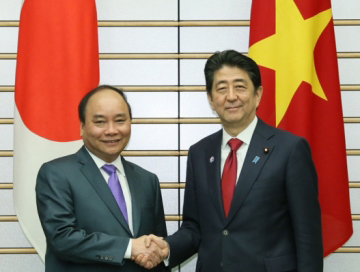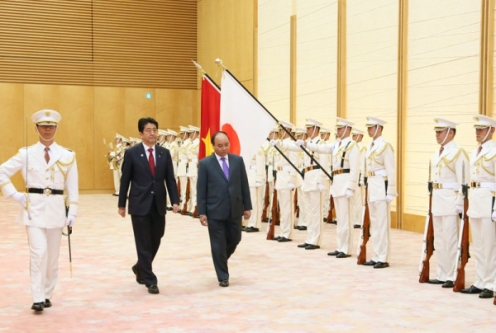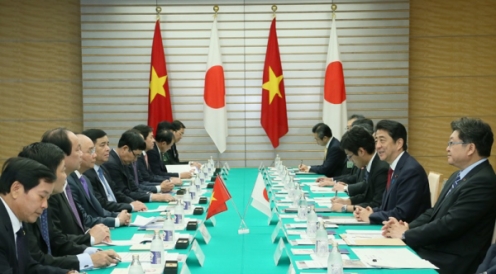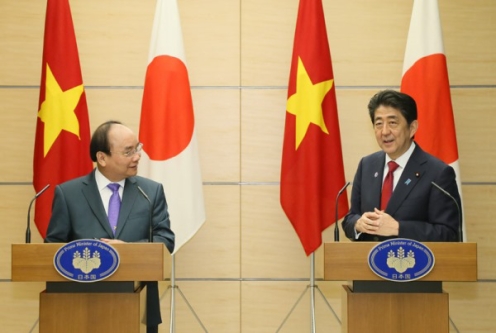Ministry of Foreign Affairs of Japan [Thursday, May 26, 2016]
Japan-U.S. Summit Meeting
On the evening of May 25, commencing at 9:40 p.m. for approximately 20 minutes, Mr. Shinzo Abe, Prime Minister of Japan, held a small meeting with the Honorable Barack H. Obama, President of the United States, who is visiting Japan for the G7 Ise-Shima Summit, and an expanded meeting with President Obama commencing at 10:00 p.m. for approximately 35 minutes. The overview is as follows.
1. Small group meeting
(1) At the small meeting, the entire time was spent discussing the incident that occurred in Okinawa. Prime Minister Abe stated to President Obama that: (a) he felt strong indignation over the incident, which was a self-centered and absolutely despicable crime, and lodged a strong protest as Prime Minister of Japan; (b) the incident caused a huge shock not only to Okinawa but to the entire nation, and he hoped President Obama would take these feelings of Japanese citizens seriously; (c) he has a responsibility to protect the lives and property of Japanese citizens; and (d) he seeks strict actions, including the full implementation of effective measures to prevent recurrences.
(2) In response, President Obama stated that: (a) he expresses his sincerest condolences and deepest regrets and profoundly understands his responsibility concerning the crime committed by a person related to the U.S. forces; and (b) the United States will cooperate fully with Japan’s investigation, and will spare no effort to cooperate in every way to achieve justice.
(3) The two leaders shared the view that Japan and the United States would hold thorough consultations in order to pursue effective measures to prevent recurrence, and Japan and the United States would work together to regain the lost confidence and would make every effort to mitigate the impact on Okinawa.
2. Expanded meeting
(1) Opening Remarks
At the beginning of the expanded meeting, Prime Minister Abe expressed his happiness at being able to meet President Obama in the scenic location of Ise-Shima, and his sincere gratitude for the heartfelt sympathy from the United States and prompt and powerful assistance in response to the Kumamoto Earthquake.
Prime Minister Abe also sincerely welcomed President Obama’s historic decision to visit Hiroshima, and the two leaders shared their intention to deliver a powerful message on a world free of nuclear weapons.
Furthermore, the two leaders shared the view that Japan and the United States will coordinate closely on the G7 Summit and display the G7’s unwavering resolve and response to international and regional challenges.
(2) Global economy
In light of the increasingly uncertain global economic situation at present, the two leaders shared the view that Japan and the United States will cooperate to realize strong, sustainable, and balanced growth.
(3) TPP
Prime Minister Abe explained that he hoped to deliver a powerful message at the Summit on promoting Mega Free Trade Agreements (FTAs), including the Trans-Pacific Partnership (TPP) Agreement, and the two leaders shared the view that they will continue with efforts to have the TPP Agreement promptly approved.
(4) North Korea
Prime Minister Abe stated that it was important for the G7 to issue a clear message that it could not tolerate the possession of nuclear weapons by North Korea becoming established as a fait accompli, and the two leaders once again shared recognition that coordination between Japan, the United States, and the Republic of Korea was important.
Prime Minister Abe conveyed his gratitude for the United States’ cooperation on the abductions issue, and requested the United States’ continued understanding and cooperation.
(5) East Asia situation
Prime Minister Abe stated that he hoped to further strengthen the network of peace and prosperity that was founded on the U.S.-Japan Alliance, and expressed the view that strengthening cooperation with Association of Southeast Asian Nations (ASEAN) members such as Viet Nam and the Philippines, which President Obama just visited, was a pressing issue. Regarding the importance of the rule of law at sea, the two leaders confirmed that Japan and the United States will solidly fulfill their roles within the international community.
(6) Climate change
President Obama stated that he hoped to count on Prime Minister Abe’s leadership in bringing the Paris Agreement that was adopted at the 21st session of the Conference of the Parties (COP21) into force promptly, and the two leaders confirmed proactive cooperation on this matter.
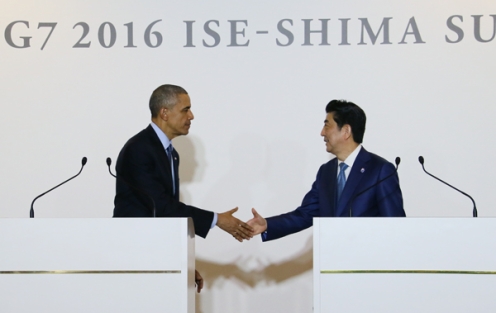
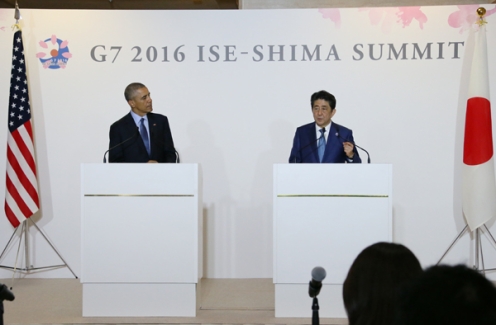
Ministry of Foreign Affairs of Japan [Tuesday, May 24, 2016]
Japan-Canada Summit Meeting
On May 24, commencing at about 6:25 p.m. for approximately one hour, Mr. Shinzo Abe, Prime Minister of Japan, held a Summit Meeting with the Rt. Hon. Justin Pierre James Trudeau, Prime Minister of Canada, who is visiting Japan as an official state guest. The overview of the meeting is as follows.
1. Opening Remarks
(1) Prime Minister Abe expressed a heartfelt welcome for the Prime Minister’s visit to Japan and commented that the two leaders had deepened their mutual understanding through the two previous Summit Meetings and that he hopes to reconfirm collaboration between Japan and Canada for success in the Ise-Shima Summit and conduct a broad exchange of views on bilateral cooperation.
(2) In response, Prime Minister Trudeau noted that he had been looking forward to this visit to Japan and was happy to receive a warm welcome from Japanese people, that there is significant potential to further advance friendly relations with Japan, and that Japan, the destination for his first bilateral visit in Asia, is an important partner in the Asia-Pacific region, and that he has great hope for Prime Minister Abe’s leadership at the Ise-Shima Summit.
(3) The two leaders agreed to further advance their bilateral relations that have a long history and bolster collaboration in the international arena as well as create a new era for cooperation between Japan and Canada.
2. G7 Ise-Shima Summit
The two leaders discussed responses for realizing robust, sustainable, and balanced growth in light of the current global economic situation with its growing uncertainty in regard to the global economy, the top theme for this Summit, and agreed that the G7 nations should take the lead in addressing the global economy and challenges to the international order.
3. Bilateral cooperative relations
(1) Prime Minister Abe commented that he hopes to further deepen security cooperation between Japan and Canada, and Prime Minister Trudeau stated that Canada hopes to proceed with security cooperation, including PKO activities.
(2) Prime Minister Abe noted that Japan wants to support Japanese studies at Canadian universities in order to promote mutual understanding between the two countries, and Prime Minister Trudeau commented that he welcomes assistance for Japanese studies.
(3) Both leaders welcomed the agreement to promote evolution of the Japan-Canada Joint Economic Committee (JEC) in order to meet today’s requirements in five main areas of infrastructure, energy, science and technology, business environment and investments, and tourism and student exchanges. They agreed to create a “new JEC” at an early stage and move forward in cooperation.
(4) Additionally, Prime Minister Abe stated that it is vital to promptly realize LNG exports from Canada and quickly move to create visible improvements in the business environment, and voiced his expectations for leadership by Prime Minister Trudeau. In response, Prime Minister Trudeau explained that he is taking these matters seriously and intends to proceed with detailed responses.
4. Regional situations and other matters
(1) The two leaders exchanged opinions on conditions in East Asia, including North Korea, and confirmed the need for applying meaningful pressure on North Korea through strict enforcement of the Security Council resolution and other sanctions. They also agreed to conduct strategic discussions on regional situations, such as the South China Sea and Russia and Ukraine, at the Ise-Shima Summit.
(2) Prime Minister Abe explained that early execution of the Trans-Pacific Partnership (TPP) is important for strengthening the economic relationship between Japan and Canada and that Japan is striving for early approval in its National Diet. The two leaders confirmed that they intend to make advances on this debate in their respective countries.
5. Cooperation in the international arena
The two leaders confirmed their collaboration on early execution and effective implementation of the Paris Agreement and agreed to continue cooperating on responses to global issues, including climate change.
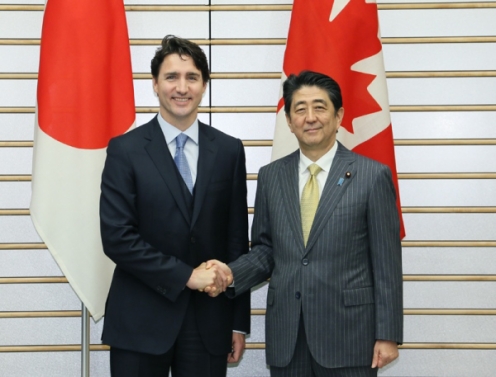
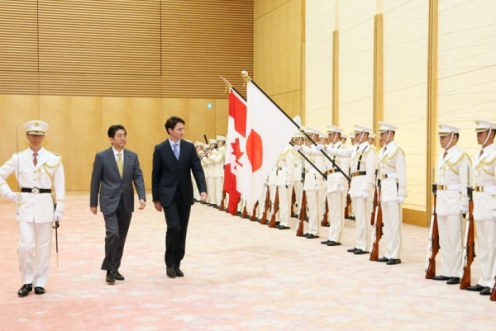
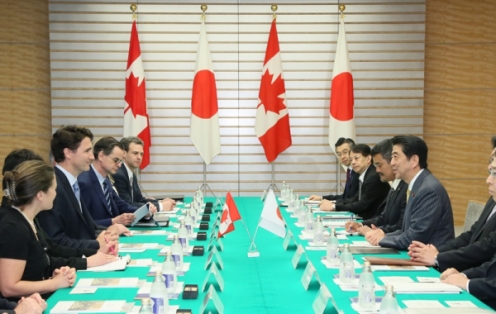
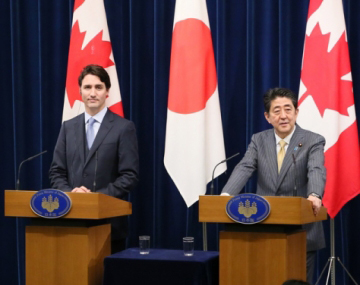
Ministry of Foreign Affairs of Japan [Saturday, May 28, 2016]
Japan-Viet Nam Summit Meeting
On May 28, commencing at 5:40 p.m. for approximately 20 minutes, Mr. Shinzo Abe, Prime Minister, held a small meeting at the Prime Minister’s Office with H.E. Mr. Nguyen Xuan Phuc, Prime Minister of the Socialist Republic of Viet Nam, who was visiting Japan to attend the Outreach Meeting of the G7 Ise-Shima Summit, and then a Japan-Viet Nam Summit Meeting commencing at 6:00 p.m. for approximately 50 minutes, followed by a dinner commencing at 7:15 p.m. for approximately one hour. The overview is as follows.
1. Beginning
Prime Minister Abe once again welcomed Prime Minister Phuc to Japan and congratulated him on his appointment as Prime Minister and the success of the recent National Party Congress. Prime Minister Abe also expressed gratitude for Prime Minister Phuc’s attendance at the Outreach Meeting of the G7 Ise-Shima Summit and his positive contributions to the discussion, and explained that he intends to strengthen cooperation with Viet Nam in the fields that were raised at the Outreach Meeting also, based on the Extensive Strategic Partnership.
Prime Minister Phuc highly appreciated Prime Minister Abe’s role as Chair of the G7 Summit and the Outreach Meeting, and expressed his appreciation for the courteous hospitality at the Prime Minister’s Office. Prime Minister Phuc explained that Viet Nam (which has shifted to a new leadership) continues to attach importance to Japan as a long-term, crucial partner, and intends to strive to develop the bilateral relationship.
2. Bilateral relations
(1) High-level exchanges, etc.
The two leaders shared the view that they will work closely together on bilateral cooperation and challenges in the regional and international arenas through active high-level exchanges and holding bilateral meetings at international conferences and fora, as well as through existing dialogues such as the Japan-Viet Nam Cooperation Committee.
(2) Natural disasters
Prime Minister Abe conveyed his condolences for Viet Nam’s drought and salt damage, and explained that Japan recently decided to extend emergency grant aid of 2.5 million USD. Prime Minister Phuc expressed his deep gratitude, along with stating that in the interest of assisting citizens struggling with the damage, he hopes Japan will continue to take an interest. Prime Minister Phuc also expressed sympathy for the recent Kumamoto Earthquake on behalf of the citizens and Government of Viet Nam, and Prime Minister Abe expressed his thanks for the words of condolence.
(3) Quality infrastructure
Prime Minister Abe explained to Prime Minister Phuc that Japan intends to make greater contributions to developing quality infrastructure throughout the world through the “Expanded Partnership for Quality Infrastructure,” a recently-announced initiative totaling approximately 200 billion USD, along with stating that from this standpoint, notes on a yen loan for the Ho Chi Minh City Urban Railway Project Line 1 was exchanged on the same day. Prime Minister Abe also expressed expectation that the construction of Line 1 will be integrated with the development of the Ben Thanh underground shopping mall, and both projects will become symbols of Japan-Viet Nam cooperation. Prime Minister Phuc conveyed his gratitude for the Official Development Assistance (ODA) that Japan has extended to Viet Nam thus far, and stated that from the viewpoint of strengthening connectivity also, he welcomed Japanese companies’ participation in infrastructure development projects. In addition, the two leaders shared the view that they will promote cooperation in the field of human resources development, including establishing Japan-Viet Nam University and introducing technical colleges in Viet Nam.
(4) Strengthening maritime law-enforcement capabilities, and defense exchange
Prime Minister Abe expressed the view that strengthening Viet Nam’s maritime law-enforcement capabilities is an urgent issue, and explained that Japan will provide solid support. Prime Minister Abe stated that the procedure for providing used vessels and a study on the provision of newly-built vessels also will be undertaken with a sense of urgency. In response, Prime Minister Phuc expressed his gratitude for the provision of used vessels to Viet Nam’s maritime law-enforcement agency, along with voicing strong expectation with regard to cooperation in the form of human resources development and the provision of newly-built patrol vessels.
With regard to defense cooperation, the two leaders expressed satisfaction that defense cooperation and exchange is progressing steadily in various fields, and shared the view that they will continue to promote cooperation.
(5) Other
The two leaders also exchanged views on the Trans-Pacific Partnership (TPP) and the Regional Comprehensive Economic Partnership (RCEP), along with sharing the view that they will promote greater cooperation based on the Japan-Viet Nam Medium-Long Term Vision On Agricultural Cooperation.
3. Cooperation in the regional and international arenas
Prime Minister Abe explained that he visited Hiroshima on the previous day with the Honorable Barack H. Obama, President of the United States of America, and reiterated his resolve for a world without nuclear weapons, and stated that he also hopes to strengthen coordination with Viet Nam through the United Nations and other such fora in order to realize a world without nuclear weapons.
The leaders shared strong concerns over the further escalation in attempts to unilaterally change the status quo in the South China Sea, including large-scale and rapid land reclamation, the construction of outposts and their use for military purposes, and affirmed the importance of the rule of law at sea, freedom of navigation and flights, and peaceful settlement of conflicts. The two leaders also confirmed that Japan and Viet Nam will work together to resolve various problems related to North Korea.
Additionally, the two leaders confirmed cooperation at Association of Southeast Asian Nations (ASEAN)-related meetings this year, and Prime Minister Abe expressed hope that ASEAN members will act with unity.
